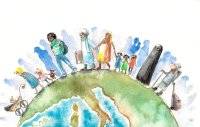Sharing Immigrant Experiences in the Classroom
Exploring the perspectives of immigrants with students helps them better understand the meaning of citizenship in a democracy.
Your content has been saved!
Go to My Saved Content.Today, the foreign-born population of the United States is the highest it has been in more than a century. Nearly a quarter of the U.S. population does not speak English at home. Meanwhile, the number of undocumented immigrants in the United States, long thought to be around 11 million, may be as high as 22 million.
Immigration remains one of the most contentious issues facing America. Social studies teachers, therefore, need to bring the conversation about immigration to our students. One way we can do this is to bring immigrants and new Americans into our classrooms, be it as guest speakers or through the use of testimonials, books, or videos.
Incorporating immigrant voices in the classroom offers two important benefits. First, students consider the American experience from new perspectives. Why is our Constitution different? Why do people risk their lives to come here? Second, it provides a compelling springboard for conversations on difficult questions about who our nation should accept into its ranks as citizens.
A Personal Story
Last year, my friend Ferki, who immigrated to the United States from Kosovo as a 16-year-old refugee, spoke to my class about his experiences.
Ferki, an Albanian Kosovar, watched as the government of Slobodan Milosevic sought to destroy Kosovo’s independence movement in the 1990s. As the repression intensified, the country descended into bloodshed. Ferki and his family made the journey to Macedonia, where they settled in a refugee camp before entering the U.S. in 1999 and moving to Erie, Pennsylvania.
Despite initial obstacles, Ferki grew to love the U.S. He and the other refugees from the Balkans began to shed old identities and become Americans.
Ferki emphasized to my students that liberty and pluralism are not natural elements of a society. They must be cultivated and protected. Creating a society in which people and opinions are universally respected, Ferki explained, demands that we talk to one another, meet our neighbors, get involved in our communities, and take an interest in the well-being of our institutions and ideals. Because he had personally witnessed what happens when the rule of law and civil society erode, his words carried extraordinary weight.
Ferki recalled one story my students found particularly chilling. Before the outbreak of the war, administrators at Ferki’s school enacted a new policy: students were to make regular visits to a “counselor” who would quiz them on their beliefs, their home life, and their family’s politics. Ferki described how his parents meticulously prepared him for these meetings. One slip-up could mean arrest or worse for him and his loved ones. My students expressed astonishment at such a policy, the horrific consequence of a government criminalizing thought and expression.
Personal stories humanize the topic of immigration and open up discourse concerning immigration history, law, and concepts such as economic migration, legal and illegal immigration, and refugee rights. My class talked mainly about the refugee experience.
Though Ferki came to America under the specter of war, he managed to infuse his story with humor. Asked by an American aid worker in the refugee camp where they wanted be relocated, Ferki’s family said they would like to live near New York, a city they had seen in the movies. Several months later, Ferki found himself in Erie, only minutes from the border of New York state. “I didn’t know there was a New York state!” he explained. Such intimate moments—funny or poignant—drew the kids into the discussion in an engaging way. In the future, I plan to use other personal stories for other types of immigrant experiences.
Personal Narrative As a Springboard for Conversation
Depending on the testimonial or speaker, teachers may focus the classroom conversation on any number of difficult topics. If educators couple firsthand accounts of migration with concerns about border security and undocumented immigration, for instance, students may begin to recognize the challenges lawmakers face in trying to address people’s desire for a better life with the mission to uphold existing law.
How should lawmakers balance the safety and well-being of American citizens with our country’s ideals and historic role as a place of sanctuary and opportunity for newcomers? How do we decide who gets to come here and how? How should our nation humanely enforce the law on its southern border, while not incentivizing a journey in which many are killed or exploited? What, ultimately, is America’s responsibility to its own people, and to the people of the world?
These are tough questions that draw as much upon ethics as political theory.
Though our classes likely will not arrive at answers, hearing from people whose lives have been affected by immigration policy may illustrate how seemingly intractable and morally fraught these questions remain. It helps our students to empathize with the immigrant, as well as the politician who must think with both the head and heart.
Ferki eventually earned his EdD and now serves as president of a community think tank in Erie. His observations about the meaning of citizenship in a democracy resonated with my class, motivating us to discuss many important issues: What makes America different from many other places in the world, and why do millions of people want to live here? What issues in our local community demand attention? And, lastly, how can we get involved, even in small ways, with safeguarding what we most love in our neighborhoods and cities?
While Ferki is only one individual and his experience does not represent the entire complexity of the immigration system, he offered a concrete example of an immigrant who achieved the American dream. His talk made the promise of America come alive for my students.
